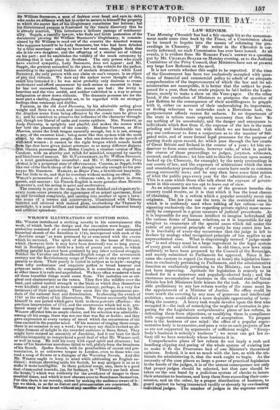WILSON'S ILLUSTRATIONS.OF SCOTTISH SONG. -
Mn. WILSON introduced a striking novelty in his entertainment this week, of which both the design and the execution were happy. His prelection consisted of a condensed but comprehensive and animated historical sketch of the Rebellion in 1745, interspersed with such of the "Jacobite songs " as were produced by or connected with the events which he narrated. The spirit of devotion to the house of STUART, Which (however little it may have been, deserved) was so long preva- lent in Scotland, gave birth to a body of poetry and music, to which nothing parallel has ever been produced by any other national struggle. Neither the Cavalier and Roundhead English songs of the seventeenth century nor the Revolutionary songs of France are in any respect com- parable to them. Their poetry is varied in'subject as in style—ranging from lofty enthusiasm' and exquisite pathos to broad humour and poignant satire ; while, in composition, it is sometimes as elegant as at other times it is rude and unpolished. We have often wondered where all these beautiful things could come from. The melodies are as ori- ginal and characteristic as' the verses. They flew like wildfire over the land, and added tenfold strength to the blaze at which they themselves were kindled; and yet no trace remains (except, perhaps, in a very few instances) of their authorship. They seem like the spontaneous pro- duce of the national heat and fermentation. In choosing the events of 1745 as the subject of his illtistrations, Mr. Wiisoe necessarily Mulled himself to one period which gave birth to those patriotic effusions : the previous insurrection of 1715, and the occurrences which led to it, pro- duced many of the fittest among them. But the period taken by Mr. WILSON afforded him an ample choice, and his selection was admirable : among all his songs, there was not one that was flat or feeble ; and they gave expression to every variety of mood which the occurrences of the time excited in the popular mind. Of his manner of singing these songs, there is no occasion to say a word; but we may say that it excited an ab- solute ferment of delight in the crowded audience at Store Street. They might have seemed an assembly of Jacobites, had it not been for their obvious incapacity to comprehend a good 'deal of what Mr. WiLsott as well as sang. He told his'story with equal spirit and clearness; but some of his humorous aneCdotes failed to tell, plainly from the broadness of his Scotch. Spoken Scotch, with its peculiarities of accent and pro- nunciation, is an unknown tongue in London, even to those who can read a song of Buses or a dialogue of the Waverley Novels. And this Mr. %Laos ought to keep in mind while addressing an Bnglish au- thence: without throwing'aside his Scotch, he may mitigate it so as to make it mote intelligible. In these political songs, also, there is a good deal of concealed inuendo, (as, for instance, in "There's use luck about the house,") which was evidently for the avoidance of danger in those troubled times, and which is now obscure even to Scotcbmen themselves. For this there is no remedy, unless by making the audience aware of it : but we think, in so far as dialect and pronunciation are concerned, Mr. WILsost may be less brosd without any sacrifice of nationality.


























 Previous page
Previous page